Introduction to Pope Francis’s Financial Reform Mission
Pope Francis has taken on the mission to reform and bring transparency to the often deficit-ridden and opaque finances of the Vatican. Previous pontiffs have attempted similar reforms without success, leaving Pope Leo XIV with the ongoing challenge of rectifying these financial issues.
Background on Vatican Finances
Despite income from hospitals, museums, donations from faithful and dioceses, and rental of its extensive real estate holdings, the Vatican’s finances remain chronically deficit-ridden. The pension fund also faces a significant structural imbalance.
Although the Vatican does not regularly disclose its financial reports, in 2023, it reported a consolidated loss of nearly €70 million against revenues of €1.2 billion.
The Vatican’s history is marred by financial scandals, exemplified by its bank, the Institute for the Works of Religion (IOR).
Links to Organized Crime
For years, the IOR was a major shareholder in the significant Italian bank Ambrosiano, accused of money laundering for drug traffickers and organized crime.
Following the discovery of a $1.2 billion fraud in Ambrosiano’s accounts, the bank collapsed, leaving the Vatican with a debt exceeding $240 million.
In the same year, 1982, Ambrosiano’s director, Roberto Calvi, was found hanging from a bridge in London. Italian judges later suggested a possible murder linked to organized crime.
When Pope Francis began his papacy in 2013, the United States had just placed the Vatican on a list of countries with concerns regarding anti-money laundering efforts.
Key Financial Challenges
- Opaque Finances: The Vatican’s financial records are not regularly disclosed, making it difficult for the public and stakeholders to understand its financial health.
- Chronic Deficits: Despite substantial income sources, the Vatican’s finances remain deficit-ridden, indicating inefficient management or unaddressed issues.
- Pension Fund Imbalance: The Vatican’s pension fund faces a significant structural imbalance, raising concerns about the long-term financial security of its employees.
- Historical Financial Scandals: The Vatican’s history is marked by financial scandals, including the Ambrosiano bank fraud and links to organized crime.
Impact on the Catholic Church and Global Perception
Pope Francis’s financial reform mission is crucial not only for the Vatican but also for the Catholic Church’s global reputation. Transparency and financial stability can restore trust among the faithful, donors, and international communities.
Addressing these financial challenges will enable the Vatican to allocate resources more effectively, support its charitable endeavors, and maintain its global influence.
Key Questions and Answers
- What are the main financial challenges facing the Vatican? The Vatican faces chronic deficits, opaque financial records, a pension fund imbalance, and a history of financial scandals.
- Why is Pope Francis’s financial reform mission important? This mission aims to restore trust, ensure financial stability, and enable the Vatican to allocate resources more effectively for charitable purposes.
- What historical financial scandals has the Vatican been involved in? The Vatican has faced issues like the Ambrosiano bank fraud and links to organized crime.






